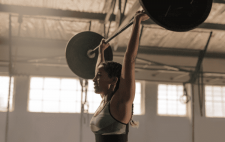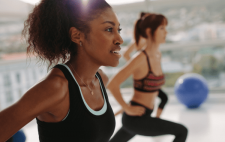There’s no one-size-fits-all approach to fitness, especially for women. From fluctuating energy levels to misconceptions about strength training, the unique realities of a woman’s body call for informed choices and smart strategies. But by tuning into these needs – and silencing some long-standing myths – women can maximize their workouts and set the stage for long-term health.

Thomas Novack, MD
 Hormones affect your workout
Hormones affect your workout
Hormonal fluctuations can influence energy and performance. In the first half of the cycle, when estrogen levels are higher, women often feel stronger and more energetic, making it ideal for intense workouts. As the cycle progresses and progesterone increases, energy levels can dip. During menstruation, fatigue may become more noticeable when iron levels are typically lower due to blood loss.
This fatigue is often linked to changes in iron, vitamin D and calcium levels, which are critical for muscle function and stamina, says Thomas Novack, MD, an orthopedic surgeon with South Jersey Orthopedic Associates. Dr. Novack advises paying extra attention to nutrition and hydration to counteract this. “If you’re more tired than usual, consider adjusting your routine or focusing on recovery,” he says. “Make sure you’re supporting your body with proper nutrition and supplements if needed.”
For women in perimenopause and menopause, the hormonal changes can be even more pronounced. “This phase of life can throw everything out of balance – energy, muscle tone and even mood,” he adds. Adjusting workouts to align with these changes can help. “It’s important to pay attention to how you’re feeling,” Novack says.
Julie Magallanes-Montone, DO, Director of Weight Management for Jefferson New Jersey, emphasizes that consistency is key, even when energy levels fluctuate. “Even a brisk walk can make a big difference,” she says. “Exercise stabilizes hormones, improves energy and helps reduce stress.”
 It’s really smart to lift weights
It’s really smart to lift weights
Strength training offers critical health benefits, particularly for women over 30. “After age 30, women lose about 1% of their bone density each year,” says Magallanes-Montone. “When you lift weights, your muscles pull against your bones, which stimulates them to grow stronger and helps preserve bone density.”
“Bone health is critical for aging well,” Novack says.” By strengthening your bones in your 30s and 40s, you’re protecting your quality of life and independence later on. The earlier you start, the better.”

Julie Magallanes Montone, DO
 Self-care isn’t selfish
Self-care isn’t selfish
For many women, the biggest obstacle to working out isn’t physical – it’s mental. Too often, the pressure to prioritize others leaves little room for self-care.
“I had a patient recently tell me she hadn’t even had a glass of water all day because she was too busy taking care of everyone else,” Magallanes-Montone recalls. “This is so common. Women feel guilty taking time for themselves, but it’s critical for their health.”
Even small efforts can make a big difference. “A 10-minute walk after a meal can balance blood sugar and improve metabolism,” Magallanes-Montone says. “You don’t need hours at the gym to feel better. Just start somewhere and build from there.”
 Find what works – now
Find what works – now
As women age, fitness routines usually need to be adjusted to accommodate new needs and capabilities. Novack encourages women to embrace change instead of feeling frustrated. “The workouts that worked for you in your 30s might not work in your 50s, and that’s ok,” he says. “Listening to your body and making adjustments can make all the difference.”
Pushing too hard can also backfire, especially as hormonal shifts during perimenopause and menopause affect energy levels and recovery times. Novack advises taking a balanced approach. “Recovery isn’t just taking a day off – it’s a chance for your body to rebuild,” he explains. “Scaling back when needed isn’t failure. It’s part of staying healthy and consistent.”
Ultimately, fitness isn’t about hitting arbitrary goals – it’s about feeling good in your own skin. “When you move your body, you feel better,” Magallanes-Montone says. “It’s as simple as that.”















